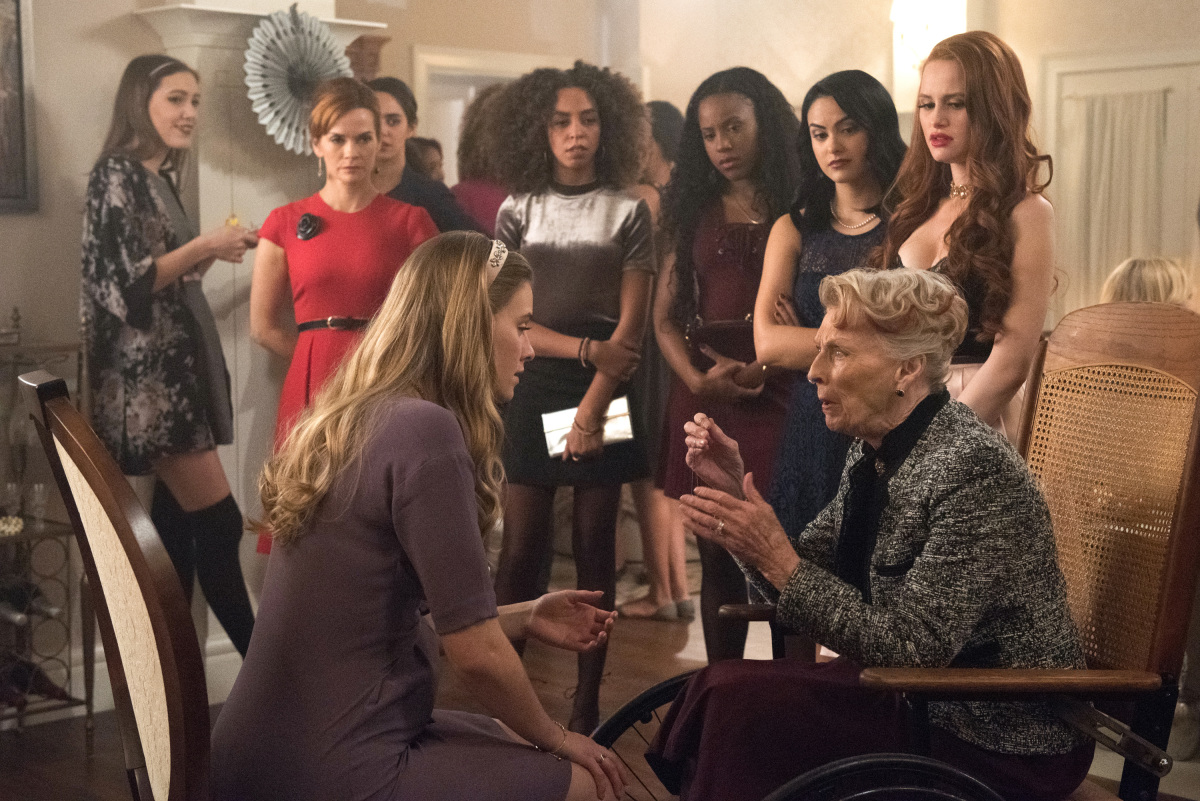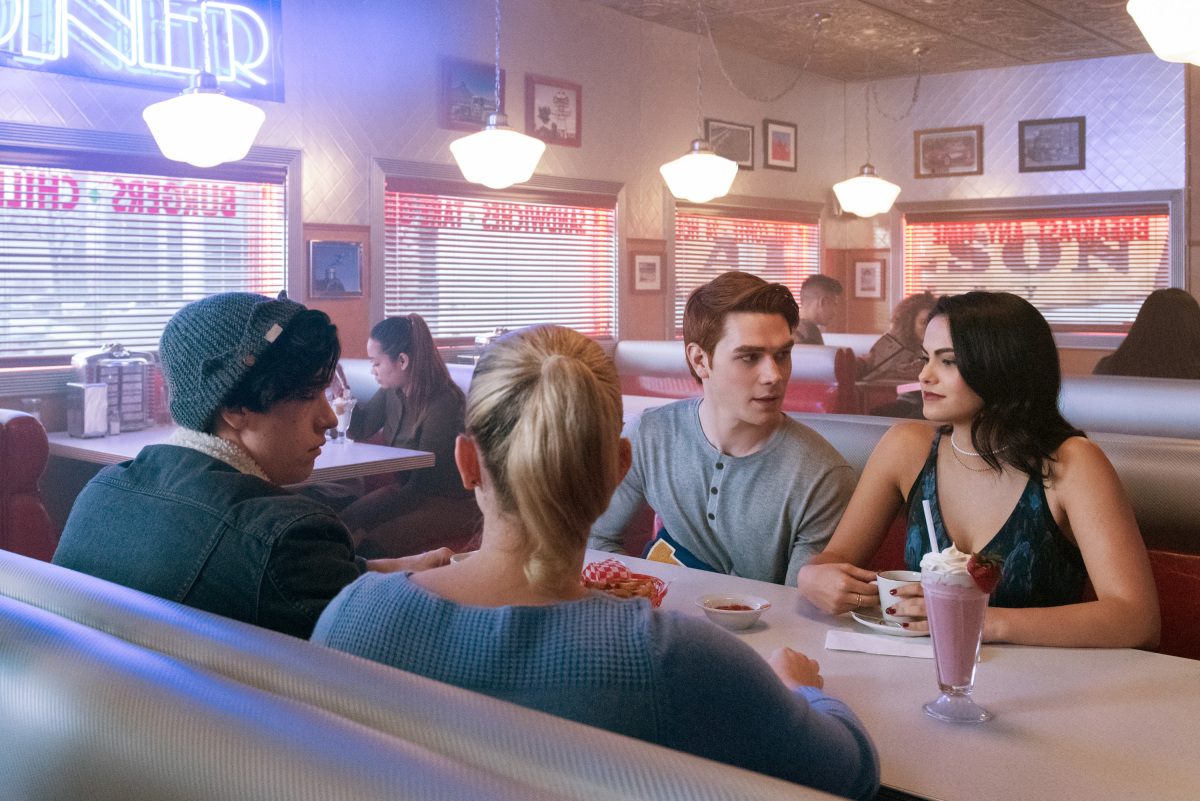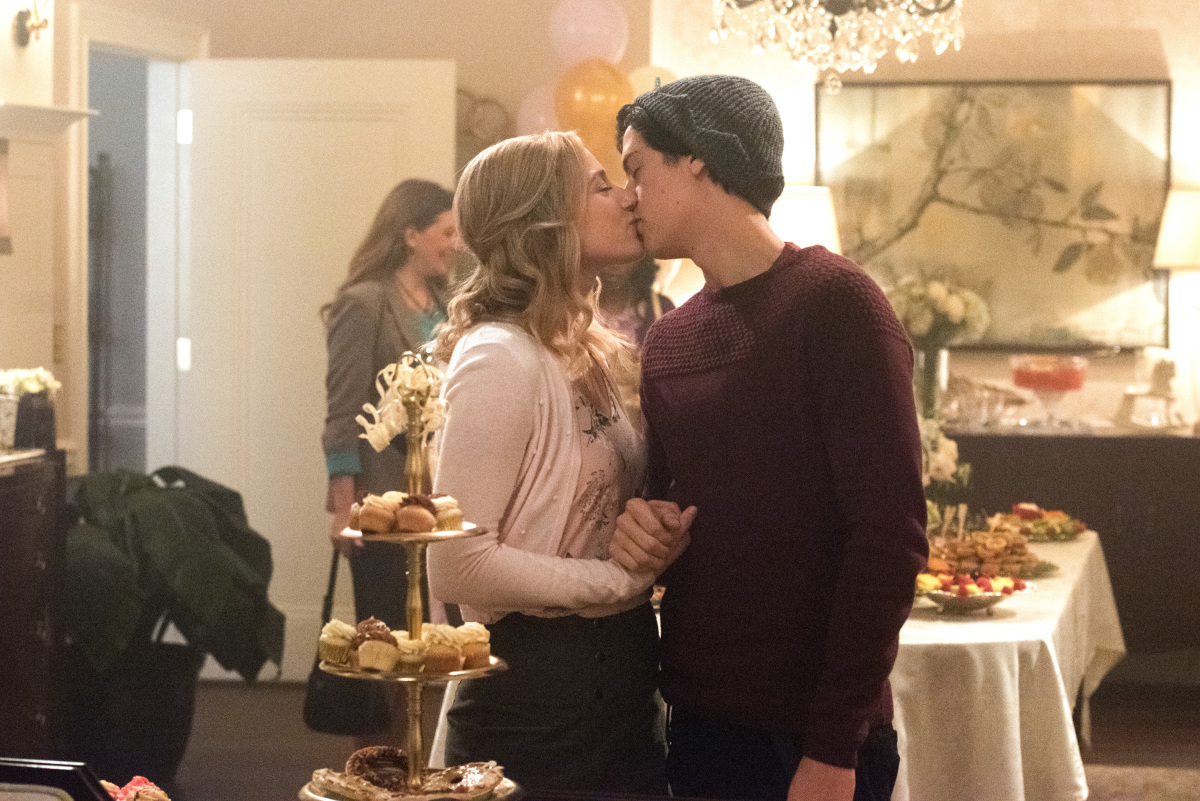
Riverdale Season 1 | Episode 8 | “The Outsiders” | Aired March 30, 2017
AAAAAUUUUGGGHHH!!!!
Yes, this is how I feel right now about Riverdale, and all of that got bottled up and compacted into this particular episode. Yes, Polly had her baby shower, she’s moved in with the Blossoms, Archie and Betty found out that Jughead’s dad is a Serpent, Kevin’s Serpent boyfriend Joaquin is having second thoughts about deceiving him, etc., etc. Now, let’s get to what really needs to be discussed: JUST WHERE IS THIS SHOW HEADING?!
I feel like this show is treating us like how Lisle Von Rhuman treated Madeline Ashton in Death Becomes Her. Riverdale is teasing us with a show beyond our wildest imaginations–inclusion, diversity, a fresh take on Archie and the gang, etc.–and it gives us what we think we want. But then, it comes back to us and says, “Now, a warning.” To which we say, like Madeline, “NOW a warning?!” For us, that warning would have been that the show would begin to lose its way and forget what made its characters great and, indeed, avatars for those who didn’t feel included in their everyday lives.
First of all, I feel like, and have always felt like, Riverdale has the potential to be amazing. There’s so much raw stuff inherent in the Archie Comics canon and it’s so frustrating to see how little the show is using what it could use. Instead, it’s pulling from every kind of pop culture reference from the past 30 years to show it’s “smart” and “edgy” and “hip.” And yet, it still comes off as dated and try-hard.
I think Emily Nussbaum hit the nail on the head in her review of the show for The New Yorker, “Archie’s and Veronica’s Misconceived Return to Riverdale,” in which she eviscerates the show for the reasons presented above. To quote her:
“…[S]even episodes in, it’s devolved into dull cosplay bracketed by bogus profundity. Betty and Veronica don kink-wear and roofie Chuck Clayton, a slut-shaming football player. The girls’ tart-tongued gay bestie, Kevin (a character from the new version of the comic strip), seduces a bi-curious Moose. Archie, when not working out shirtless, pursues a songwriting career. “Your songs,” a critical music professor sneers at him. “They’re juvenile. They’re repetitive.” That’s true of ‘Riverdale,’ too, but the show clearly knows it and doesn’t care. Every time a plot feels corny or prurient or preachy, there’s an acknowledgment in the dialogue. It gets exhausting, like hanging out with someone who keeps saying, ‘God, I’m such a nightmare!'”
It’s like the show desperately wants to prove that it’s new and fresh. “This isn’t your mom’s Archie!” is what it wants to say. But it’s consistently showing that it’s a a show that doesn’t realize that teenagers, in general, don’t talk in decades-old references, which makes it seem like this is a show actually for older Archie fans who recognize all of these references from their own childhoods. As Nussbaum said, the show brings up Lolita, Rebel without a Cause, Wild Things, Gossip Girl, Beverly Hills 90210, Pretty in Pink, Faster, Pussycat! Kill! Kill, and plenty of others they off-handedly mention in snarky asides. Like, what do you actually want to be, show! Are you for the young kids or are you for 30-year-olds? Make up your mind!
I have been growing frustrated by the plot becoming a spinning-of-the-wheels type situation. Jason’s killer is no closer to being found, and clues seem to keep simultaneously popping up and disappearing at the same doggone time. At this point, I’m not sure if I’ll even be shocked when I find out who the killer is because I’m just so bored with the whole procedural element. Again with the references, with the murder mystery itself, the show is trying to be Twin Peaks, another reference for someone much older than the target audience. But, if the show is trying to pull a Twin Peaks-ian surrealist-fest, then when are we actually going to get into the surrealism? Again, Archie Comics has tons of surrealist moments, and that’s not even counting the amount of side-universes they have. Surrealism could come in the form of simply introducing Sabrina, a teen witch who often wants to use her powers for good, but usually ends up messing things up and has to right everything back to how it was. Sabrina could come into town, learn about the murder mystery and, after becoming friends with Cheryl and learning of her sadness, reverse time so that Jason is still alive. That could also be a good opportunity to introduce Afterlife with Archie at this moment, since Jason would be, in a way, undead. There’s your second season.
Or, the show could become a true deconstruction of the idea of classic Americana, something it was billed as being but hasn’t truly delivered on yet. Instead of having Jughead tell us that’s what the show is every week in his voice overs, we could actually see some depth of character and real explorations of race, class, gender, sexuality, and anything else that could use a thorough prodding. I’d say that if Riverdale wanted to take notes from a show doing that right now, it’d be Atlanta. This show, like Riverdale, uses the backdrop of a well-known city to explore the underpinnings of American society and culture, and it does so in a specific, tailored way. It doesn’t have to prove to the audience that it’s “edgy”–it shows its edginess in each episode by delivering on its synopsis each week.
If any place needed a deconstruction, it would be a fictional town like Riverdale, which has stood as a the center for clean-cut “American” life, which usually means white life. With much of the cast race-bent, this would have been a great opportunity to see just how destructive and soul-wrenching it can be to live in a town in which you’re the minority (which, in turn, provides context for the larger conversation about living in a country which still harbors racism against you). We could see how some folks in the football stands might be surprised to see Reggie as the captain of the team. Or, there could be some townspeople who resent that Mayor McCoy won over the white candidate (something the character actually brings up in an episode). Or, we could get more insight into the life of Moose, who doesn’t yet have the courage to live his life as an out gay young man due to fear, pressure to be “manly” or what have you. We definitely could have used Chuck, Josie, and Trev to explore life for black kids in a majority-white town.

I write about this in my piece for Ebony, “Riverdale’s Woke Report Card: Does the Drama Get Its Black Characters Right?”. I give the show a passing grade, ultimately, but I still write about how the show really needs to do better by its black characters.
“Out of the Pussycats, Josie is the one who has been given the most screen time; Valerie has only just now started coming up the ranks, but only because of her relationship with Archie. Meanwhile, Melody still hasn’t spoken more than two words during the run of the series and Pop Tate and Mr. Weatherbee may have been racebent, but they also don’t say much either—and in the case of Pop Tate specifically, nothing at all. Pop Tate is a conundrum; even though it’s great to see more representation on screen, it’s also puzzling as to why he has to be characterized as a silent, kindly butler of sorts, even though he’s the owner of the teen hangout, The Chocklit Shoppe. Basically, Riverdale’s Pop Tate reminds me too much of Uncle Ben, and I don’t like it.”
The show proved my point once again by making Valerie merely a sounding board for Archie this episode. She had three lines, and not one of them was about her point of view or her opinion on the matter of Archie’s dad being driven to near bankruptcy. Instead, her lines were there just so Archie could say he was going to go after the Serpents, as well as to give the appearance that they’re in a loving, stable relationship (which we see in the previews for next week that that might not be the case after all). The next time we see Valerie, she and Melody are at Polly’s baby shower, saying nothing.
If the show wants to be actually inclusive, the least it could do is not make its brown and black characters set dressing or talking props. The most it could do is not create a problematic plotpoint of a black boy in handcuffs at the mercy of a white girl who is acting out a revenge fantasy.
Also for diversity, the show could do well to actually eliminate Bughead and reinstate Jughead as an aromatic, asexual boy, since that’s what he actually is.
Comics Alliance’s Andrew Wheeler wrote “Jughead, Bughead, and the Need for Asexual & Aromantic Heroes in Comics” to point out just how demoralizing Riverdale‘s asexual erasure is (and how it flies in the face of their “inclusion” standpoint).
Wheeler interviewed colorist Sigi Ironmonger (a grey-asexual nonbinary trans-man); webcomic creator Sarah “Neila” Elkins, (romantic asexual), webcomic creator Jayelle Anderson (demisexual) and literature student LuciAce (aroace) about their opinions on Jughead in the comics and in Riverdale. They mentioned how important it is to have asexual representation in the media, especially for young kids still figuring out who they are. As Elkins said:
“To me it’s important because, growing up, I didn’t know it was a possibility to be asexual. I thought there was something wrong with me that I wasn’t interested in the idea of having sex like other girls my age. Friends called me a ‘prude.’ These were good friends of mine, friends who were also queer, that didn’t know that asexuality is a queer identity. Even among the ‘weird kids’ I was the odd one out.
I think if there was more representation (or any) of asexual and aromantic characters in comics as well as other books aimed at young readers, and other media, that my friends, and myself, would have known I wasn’t broken or weird. I didn’t learn about asexuality as an orientation until I was out of college. I stumbled across it online and thought, “Oh, wow! That’s what I am! This makes so much sense!” I don’t want anyone else to have to go through that, so I write asexual characters in my stuff. I hope to write something in the future, be it a comic or a novel, that’s aimed at younger readers.”
They also discussed how disheartening it was to see Jughead and Betty actually become an item, erasing the canonical asexuality the character had before (and, as far as I’m concerned, has always had). To quote Ironmonger, Elkins, Anderson and LuciAce:
Ironmonger: “Honestly, as soon as I heard about the erasure, I’ve steered clear of the show, so I can’t speak of the storyline at all. I don’t watch a lot of TV as it is and I don’t feel like prioritizing something like that, you know? I don’t really understand a decision like that and I can’t stand shoe-horned relationships of any kind but especially at the expense of LGBTQ+ ones.”
Elkins: “I really had my hopes up about that show before it came out. I was so hopeful I know I dismissed friends who said “you know they’re just gonna screw it up, right?” My friends were right. They announced online that Jughead in Riverdale “wouldn’t be asexual” and that he’d “totally want sex” or something like that. It deflated the big hope balloon I had clung onto that we’d finally have some representation on TV in a show aimed at younger viewers. It was crushing. I can’t even bring myself to look at the commercials for the show. Each time I hear the music for them I mute the TV or change the channel.”
Anderson: “Getting rid of this trait in Jughead for the television show just perpetuates the cycle of normalizing often hypersexual behavior that doesn’t fit everyone’s life. Sometimes young people’s only role model are the characters they see on television, so it is important to show that asexuality is a thing, too.”
LuciAce: “I’m really angry about the way they’re handling things. Having aroace representation on TV would have been huge, and instead, they… made him straight? Because apparently there aren’t enough allo straight characters on TV yet. I’ve never seen a character like myself on TV, and I would have been a die-hard fan of the show if they’d kept Jughead aroace and touch-averse like he is in the comics. As it is, the show just makes me furious and sad.”
The show seems to have an understanding of just how offensive Betty and Jughead as an item are, which seems evident in how they are doubling-down on shoving it down our throats (or so it seems, since the episodes have been filmed months before now). Having Jughead and Betty kiss in almost every scene seems and feels unnatural, just like how it felt unnatural when writers would try to give Jughead an interest in girls in certain comic book issues. Jughead’s characterization just isn’t one in which he’s a guy who is interested in the opposite or same sex like that, and that’s perfectly fine and normal. However, the show’s insistence on making him straight and sexual feels like a very 20th century thing to do. If we’re in an age where Kevin Keller can be proudly out as a gay teen, then we should also be in the age where Jughead can be proudly out an asexual aromantic teen. Teens in general, regardless of sexuality, shouldn’t be made to feel like they have to be in a relationship to be normal.

The last grievance I have is about that twist of a plotpoint with Hal Cooper, who apparently forced Alice Cooper to have an abortion. ¿¿Qué??
Why, what when and where did this plotpoint have to come up? Why have we had such little to show for Hal’s characterization until now? I know we had that part where he told Betty that Polly was with the Sisters for whatever dire reason they have, but I wish we had gotten the sense that Hal was a total abusive husband way before now. If that had been built up from the very beginning, that would have been really interesting and it would have given us more reason to try to understand Alice until this very episode. We would already know why she acted like someone driven to desperation–it’s because she’s been brainwashed by her husband’s fruitless demand for perfection from his family.
I guess what I’m getting at ultimately with this point is that for this to be a dramatic show about a murder, there are literally no dramatic stakes coming out of these characters. Yeah, we get it every once and a while, like with Jughead confronting his father and still trying to find some hope in his heart for him, and Cheryl coming to grips with her brother’s death. But the show is quickly losing the plot of both what it wants to say and who these characters are. The reason we have connected with these characters for 50+ years is because of their relatable cores. We all know some hapless goof like Archie, who is a great friend, but is endearingly clumsy (and sometimes emotionally tacky) all other areas of his life. We know someone like Jughead, who is so cool and interesting, yet they’re so enigmatic, you feel you know nothing about them. Veronica is definitely that person that many of us wish we could be–cool, rich, and a boy magnet–while Betty is who we feel we are at the present moment–the girl or boy next door, nice, loyal, but just “regular.” Their strengths and flaws are what make them so much fun, and either you see yourself or you see your best version of yourself in these characters. Right now, I’m not seeing anyone I relate to anymore. I was seeing it at the beginning of Riverdale, but now, as Nussbaum points out, all we’re getting is some great cosplay without the real commitment.
I’ll say that the only person in the main cast who feels like they are with their character in spirit is Cole Sprouse. Not too many of the main cast have read the comic books back to front, but Sprouse has said in many interviews how he studied his source material and, in so many words, came in with a gameplan as to how to approach Jughead from a position that would remain true to the character. However, the show itself is limiting him from actually playing Jughead the way he truly wants to play Jughead, I feel. While the powers that be want Jughead to be a sexual being, Sprouse has been advocating for Jughead to be canonically asexual, as he is in the comics. However, the powers that be aren’t hearing him, and it’s a shame, since not listening to the actor who knows the character is what could actually make this show a whole lot better and definitely a whole lot more interesting.
In short, I hope the show quits trying to prove that “It Goes There” like Degrassi and actually goes there. If this is going to be a teen murder mystery, then by all means, up the murder, up the mystery, and definitely up the characterizations, plots, and respect for the differences in others.